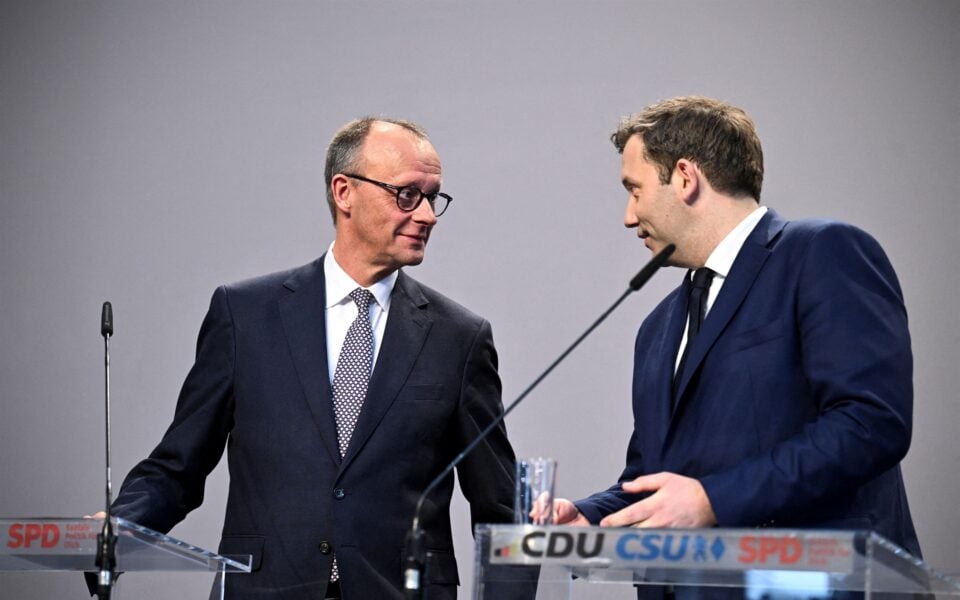
Germany’s chancellor-in-waiting and leader of the Christian Democratic Union party (CDU) Friedrich Merz (left) and co-leader of the Social Democratic party (SPD) Lars Klingbeil attend a press conference in Berlin, Germany, on April 9, 2025. [Annegret Hilse/Reuters]
Just six weeks after the German federal elections, coalition negotiators have unveiled the agreement set to guide the country’s next government. “Germany is back,” declared Friedrich Merz, chairman of the Christian Democratic Union (CDU) and the presumptive next chancellor. Following consensus among the CDU, its Bavarian sister party the Christian Social Union (CSU), and the Social Democrats on a four-year governing agenda, Merz’s election to lead Europe’s largest economy appears a mere formality.
The world has changed significantly in the six months since the so-called “traffic light” coalition collapsed in Berlin, triggering early elections that coincided with Donald Trump’s return to the White House. Since then, Trump has shaken the foundations of the Western – and by extension, European – security architecture. Germany, consumed by its electoral season, participated in these global developments, at best, from the sidelines. Any notion of Berlin playing a leadership role was off the table. That domestic political interlude is now drawing to a close.
Merz, never shy about asserting his vision, has already made clear that he intends for his government to take a commanding role. “My absolute priority will be to strengthen Europe as quickly as possible so that, step by step, we can really achieve independence from the United States,” he said on election night. Shortly thereafter, he traveled to Paris for a highly symbolic tete-a-tete with the French president. And following May 6 – when, according to media reports, he is expected to be formally elected chancellor – Merz will again board a plane, first to France, then to Poland.
Central to those visits will be the instability triggered by the increasingly unpredictable behavior of the American president. A trip to Washington is also on Merz’s agenda, though no date has been set. “I’ve already received multiple greetings from Trump,” Merz remarked in an interview, noting that he will not speak “only for Germany” when he visits the US capital. Instead, he plans to coordinate closely with European partners. The list of transatlantic flashpoints is long. “This needs to be coordinated. And for me, the priority is Europe,” he emphasized.
Anyone in Washington (or elsewhere) seeking to understand the direction Germany’s next chancellor intends to take need only study the coalition agreement unveiled last week. Spanning 144 pages, the program outlines, often in granular detail, the government’s agenda. Key interest will lie in the sections on economic policy, migration, and of course, foreign and defense policy.
Germany’s criticism of Ankara’s erosion of the rule of law and human rights violations remains unchanged. Whether this critique will affect arms cooperation is unclear
Even before officially taking office, Merz has demonstrated a strong partiality for action and a willingness to shift gears. In what many called a stunning reversal, he abandoned his long-standing insistence on Germany’s constitutional “debt brake” – which tightly limits new borrowing – and worked with the outgoing parliament to amend the constitution itself. The result: a license for unprecedented deficit spending that grants Merz and his Social Democratic partners considerable fiscal leeway. The newly approved funds, totaling in the billions, are earmarked for reviving Germany’s ailing infrastructure and jump-starting its struggling economy.
Merz has voiced his doubts – more clearly than most European leaders – about whether Washington under Trump remains committed to NATO’s mutual defense clause. And he has not stopped at rhetoric. The German parliament has already endorsed Merz’s call for a “limitless” increase in military spending. “Whatever it takes,” he has said, is what rearmament may cost to shield Germany from the perceived threat posed by Vladimir Putin’s Russia.
Since the Russian invasion, Ukraine has taken center stage in Germany’s security and foreign policy. “A strong, democratic and sovereign Ukraine that determines its own future with a Euro-Atlantic perspective is of central importance to our own security,” the coalition agreement states. Given America’s hesitancy, Berlin is expected to scale up its support for embattled Ukraine. Still, key details remain unresolved. As opposition leader, Merz supported the delivery of German-made Taurus cruise missiles to Kyiv – unlike outgoing chancellor Olaf Scholz. Yet the coalition agreement remains silent on the type of weaponry Germany will provide. Merz continues to emphasize the need for military buildup, but how much of Germany’s gross domestic product will be devoted to defense remains an open question.
Among the countries explicitly mentioned in the coalition pact is Turkey – described as “an important strategic partner within NATO, a neighbor of the EU, and an influential actor in the Middle East.” The agreement pledges to confront geopolitical challenges jointly with Ankara, “from security policy to migration.” It also notes, with diplomatic restraint, that “we regret that Turkey is increasingly distancing itself from the EU’s system of values.”
Germany’s criticism of Ankara’s erosion of the rule of law and human rights violations remains unchanged. Whether this critique will affect arms cooperation is unclear. In recent years, German-Turkish weapons deals have declined. Yet President Recep Tayyip Erdogan has made no secret of his interest in German-made military equipment. How far the new German government is willing to accommodate Ankara’s requests will also shape how Greece perceives its future relationship with Berlin.
Dr Ronald Meinardus is a senior research fellow at the Hellenic Foundation for European and Foreign Policy (ELIAMEP).